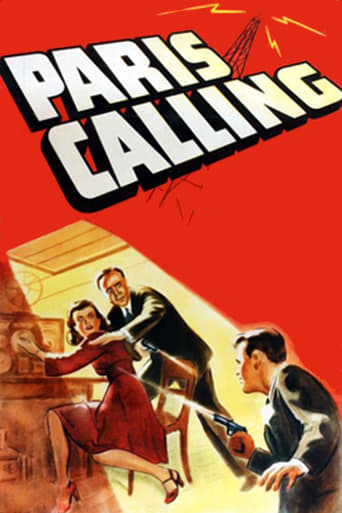JohnHowardReid
This is the movie that proves that Elizabeth Bergner can deliver just as mediocre a performance under Edwin L. Marin's direction as she can when her husband, Paul Czinner, is holding the directorial reins. Admittedly, in this instance the screenwriters have come up with what must be one of the silliest scripts of all time. Sample dialogue: "It's a long chance, and dangerous!" "Oh, Marion, please! I can't bear it when you cry!" This sort of stuff even manages to daunt Basil Rathbone. And Lee J. Cobb is ridiculously miscast as a Gestapo leader. At first, I thought Lee J. was actually clowning around for laughs, but this turned out to be not the case at all. At least Charles Arnt is wide awake and wisely plays his ridiculous lines for comedy. There's a lot of misused talent behind the camera too, including superb photography by Milton Krasner, and even a sequence credited to Jean Negulesco.
richard-1787
Hollywood made some great movies as part of the effort to win World War II. In fact, my all-time favorite movie, and one of the greatest of American movies, Casablanca, was at least in part a result of that effort.But Hollywood also made some poor films in the same category, and this, I'm afraid, is one of them.There's nothing wrong with the acting, though the mix of accents is disconcerting at times. Elisabeth Bergner, a Viennese whose English reminds me on occasion of Luise Rainer, plays a French aristocrat. Basil Rathbone plays a French politician. Lee J. Cobb plays a Nazi officer. Only Randolph Scott, playing an American pilot, comes off naturally as what he is supposed to be. Some of the lower-ranking Nazi soldiers sound too colloquially American. I suspect that Universal just didn't have the means to hire a more convincing cast, though Rathbone and Cobb were certainly good actors. (Rathbone was a Universal staple, since that's where he made the Sherlock Holmes movies.) As others have explained, it is basically the story of Bergner, who plays a very naive woman in love with a French politician and collaborator. She at first believes the lies he tells her. With the fall of France, she sees the light, however. Thereafter she becomes involved in a Resistance cell, and works to fight the Nazis.The script isn't great, however, and sometimes the action seems disjointed. The end, as a previous viewer remarked, happens too fast and is not at all convincing. It's rather like the end of Mel Brooks' remake of "To Be or Not to Be," but to be taken seriously.Some things make no sense at all. Why, for example, would Bergner's character play very dramatic classical music in a low-life bar? If you're interested in World War II movies, you might enjoy this. It's not embarrassing. It just isn't very convincing.
bkoganbing
Clearly Elizabeth Bergner wasn't thinking of posterity when she did her one and only Hollywood film. As a person of Jewish background who had the good sense to flee the Nazis in the early Thirties I'm sure she felt that doing this film about the early French resistance movement was patriotic in some way. Patriotic maybe, but bad and not a product that wears well, no doubt.In Paris Calling Bergner is an entertainer in love with Basil Rathbone an official of the French government. What she doesn't know, but finds out is that Rathbone has been a collaborator for years plotting to bring the Nazi ways to France. He's not even a collaborator after the fact of the invasion. In other words, a traitor and a rat. It doesn't help that Bergner's mother is killed on the way to Bordeaux where the French government and Rathbone have fled.Though it takes some time for them to accept her Bergner becomes quite the resistance worker. She's aided and abetted by downed RAF flier Randolph Scott, an American in their Eagle Squadron.Watching the film I was convinced that I was seeing a routine World War II era flag waver. But at the end when a mass escape of resistance fighters is affected after the Nazis have discovered them I just said to myself this was way too much. I had always considered Errol Flynn's escape in Desperate Journey was the ultimate in Hollywood lunacy, but this one may have topped it. I won't reveal a word, you'll have to see it evaluate for yourself.For her fans in Europe who might have got to see this after the war this had to be a painful experience. Equally so for fans in the English speaking world who saw her in Escape Me Never, Catherine The Great, or As You Like It.I'm sure Bergner wanted to forget it and it may be why she never did another Hollywood film.
GManfred
Ach du leiber! Those stupid Nazis are at it again. "Paris Calling" is an early (1941) French Resistance movie made in crowd-pleasing fashion, depicting a French underground group in Bordeaux vs. some two-dimensional bumbling Huns. Here, the French become preoccupied trying to hustle downed Canadian flyer Randolph Scott off to England before the Germans find out who he is. They picked the right villains, in Lee J. Cobb and Basil Rathbone, who do their despicable best - and in this corner, aiding and abetting Our Hero, are Elizabeth Bergner and Gale Sondergaard (honest!). Much of the action takes place in Sondergaard's tavern, a hotbed of underground activity.It's all pretty exciting and tense (especially scenes between Bergner and Rathbone), but there are several glaring plot holes and loose ends which prevent a higher rating, unless you are young enough not to notice. Randolph Scott had matinée idol looks but was essentially a lightweight as an actor, and here he has to carry too much of the picture. Thank goodness for Elizabeth Bergner and, especially, Basil Rathbone, one of Hollywood's best supporting actors. "Paris Calling" is a very likable picture of its type, just don't ask too many questions.


